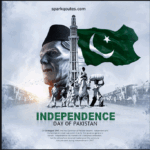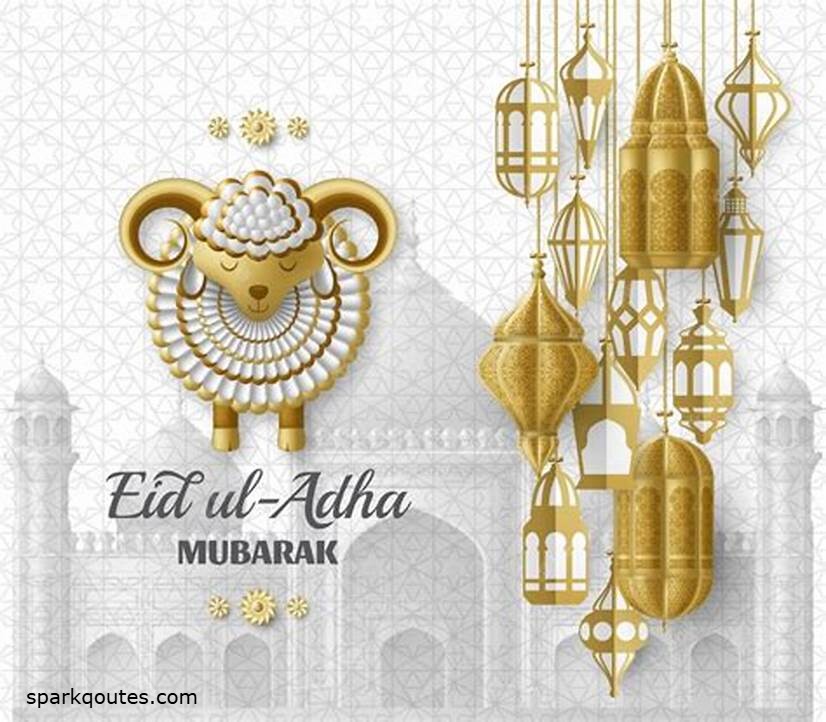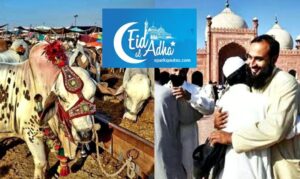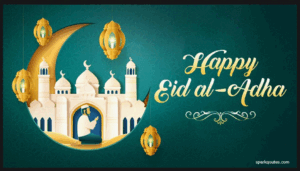Introduction
Eid-ul-Azha, also known as Bakra Eid or the Festival of Sacrifice, is one of the most important Islamic festivals celebrated by Muslims across the world . It falls on the 10th day of Dhul-Hijjah, the last month of the Islamic lunar calendar and continues for three days. This sacred event honors the willingness of Prophet Ibrahim (AS) to sacrifice his beloved son Ismail (AS) as an act of obedience to Allah’s command.
This festival is not just about sacrifice but also about faith, unity, obedience, and sharing. It teaches lessons of submission to the will of Allah and the importance of helping others .
The Historical Background
The origin of Eid-ul-Azha is deeply rooted in the Quranic story of Prophet Ibrahim (AS). According to Islamic belief, Allah (SWT) tested the faith and devotion of Ibrahim (AS) by commanding him to sacrifice his most precious possession—his son, Ismail (AS) 🧒. Without hesitation, both father and son submitted to Allah’s will. Just as Prophet Ibrahim (AS) was about to carry out the command, Allah (SWT) replaced Ismail (AS) with a ram 🐏, and the sacrifice was accepted.
This divine intervention symbolizes the importance of faith and submission. Since then, Muslims around the world commemorate this event every year by sacrificing animals and distributing the meat among family, friends, and the needy 🍖💞.
The Spiritual Significance 🌌🙏
Eid-ul-Azha is not only a celebration but a spiritual journey. It’s a time for:
Obedience to Allah (SWT) 🙏
Reminder of the power of faith and sacrifice 💫
Promotion of charity and social equality ❤️
Unity among the Muslim Ummah 🕊️
The act of Qurbani (sacrifice) is symbolic of one’s willingness to give up their desires and possessions for the sake of Allah. It represents a Muslim’s readiness to submit completely to the will of Allah, even when it requires personal loss or sacrifice 🛐.
Preparations and Celebrations 🎊🐮
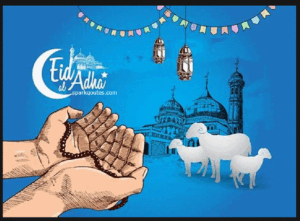
Preparations Before Eid
The excitement of Eid-ul-Azha begins well before the actual day. Muslims prepare by:
Saving money for Qurbani 💸
Buying animals such as goats, sheep, cows, or camels 🐐🐄🐫
Ensuring the animals are healthy and meet Islamic criteria
Cleaning homes and shopping for clothes 👗🧥
Organizing charity and food distributions 🍱
In many countries, livestock markets become bustling centers of activity as people visit with families to select their Qurbani animal 🛍️🐏.
The Day of Eid
On the morning of Eid, Muslims begin the day by:
Performing Ghusl (ritual purification) 🚿
Wearing their finest clothes 👔✨
Offering the Eid prayer in congregation at mosques or open grounds 🕌🌄
Listening to the Khutbah (sermon) that emphasizes the values of sacrifice and charity 📢
Embracing and greeting one another with “Eid Mubarak!” 🤗🎉
After the prayer, the Qurbani (sacrifice) is performed in the name of Allah, following the Sunnah of Prophet Ibrahim (AS). The meat is divided into three parts:
One-third for the family 👨👩👧👦
One-third for relatives and friends 🤝
One-third for the poor and needy 💝
This practice ensures that everyone, regardless of wealth or status, can enjoy the blessings of Eid.
The Importance of Qurbani 🐏🔪
The sacrifice of animals is a highly symbolic act in Islam. It is not the blood or meat that reaches Allah, but the piety and intention behind the act. The Quran says:
“Their meat will not reach Allah, nor will their blood, but what reaches Him is piety from you.”
(Surah Al-Hajj 22:37) 📜
The Qurbani reminds Muslims that life and wealth are blessings from Allah, and they should be used in ways that please Him. It’s a moment to reflect on the values of compassion, humility, and generosity.
Hajj and Its Connection to Eid-ul-Azha 🕋🚶♂️🚶♀️
Eid-ul-Azha also coincides with the annual pilgrimage of Hajj in Makkah, which is one of the five pillars of Islam. Millions of Muslims gather at the holy city to perform a series of rituals that commemorate the actions of Prophet Ibrahim (AS), Hajar (RA), and Ismail (AS).
One of the major rites of Hajj is the ritual of animal sacrifice at Mina, which reflects the same spirit of Eid-ul-Azha. Those who are not performing Hajj are encouraged to perform Qurbani wherever they are 🌍.
Social and Economic Impact 💸🌾
Eid-ul-Azha has a major impact on society and the economy:
It promotes the livestock industry, providing income to farmers and traders 🐮💰
Boosts the clothing, food, and transportation sectors due to increased demand 🛍️🚗
Encourages charity and equitable food distribution, helping reduce hunger and poverty 🥘
Brings communities together, strengthening social bonds 💬🤲
Global Celebrations 🌐🎈
While the essence of Eid-ul-Azha remains the same, cultural practices differ slightly from country to country. For example:
In Pakistan, families gather for Eid prayer and invite guests for BBQs 🍢
In Saudi Arabia, people perform Hajj and distribute meat in bulk 🕋
In Indonesia, animals are sacrificed at mosques and community centers 🕌
In Turkey, meat is distributed to neighbors and refugees 🫂
Despite cultural differences, the message of love, unity, and sacrifice remains universal.
Eid-ul-Azha and the Modern World 🌍💻
In today’s world, where materialism and selfishness often prevail, Eid-ul-Azha serves as a powerful reminder of what truly matters: faith, family, and humanity 🧭. Many Muslims now use online platforms to book Qurbani, donate to charities, and share the blessings of Eid with people in conflict zones or affected by poverty.
It’s a festival that combines tradition and technology, keeping the spirit alive in both rural and urban settings.
Lessons from Eid-ul-Azha 📚💡
Eid-ul-Azha teaches us:
Total submission to Allah’s will 💫
Importance of sacrifice in daily life 🛑
Care for the poor and marginalized ❤️🩹
Gratitude for Allah’s blessings 🙌
Unity and brotherhood among Muslims 🌐
These lessons are timeless and help Muslims lead lives rooted in purpose, generosity, and piety.
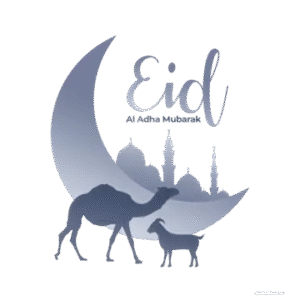
Conclusion 🌟
Eid-ul-Azha is more than just a religious festival – it’s a celebration of the spirit of faith, sacrifice, and humanity 🕊️. It reminds us of the unwavering faith of Prophet Ibrahim (AS), the obedience of Ismail (AS), and the mercy of Allah (SWT).
As Muslims around the globe gather with family and friends, share meals, and help those in need, they renew their commitment to living a life of service and submission to Allah.
May this Eid bring peace, prosperity, and joy to all. Eid Mubarak! 🌙✨🐐❤️
Would you like this article in a PDF format or translated into Urdu as well?




